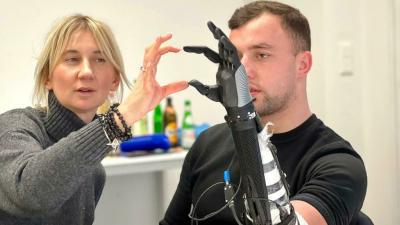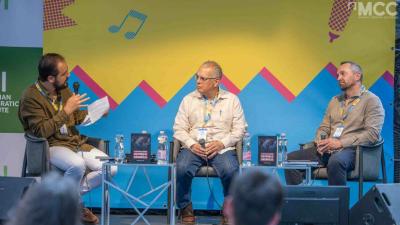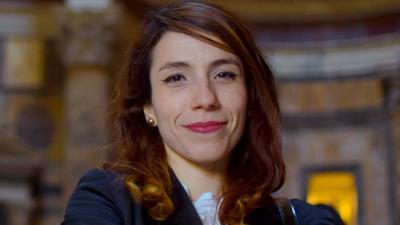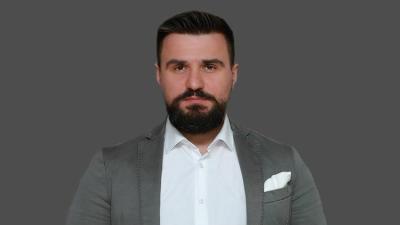Manuel Veiga Aldemira: "Technology gives a second life to many Ukrainians, some soldiers have even returned to the front"
Manuel Veiga Aldemira has a law degree and a Master's Degree in international law from Maastricht University, with specialisation in international humanitarian law. He has also attended programmes in the USA and China, and worked as an international consultant. In recent years, he has specialised in high technologies and innovation, in particular in converging transformative technologies such as robotics, artificial intelligence, additive manufacturing (3D printing), etc. He is currently a member and national delegate of the Spanish NGO Asociación Galega de Axuda a Ucraína (https://www.agaucraina.org/) and technology and innovation advisor for the Superhumans Centre (https://superhumans.com/), a centre for treating people wounded in the war.
Álvaro Peñas: Why are you in Ukraine?
Manuel Veiga Aldemira: I have been involved in supporting Ukraine since February last year, from the very beginning of the invasion. I’ve been helping NGOs and volunteers and assisting Ukrainian defenders on the frontline with humanitarian aid and non-lethal equipment (medical kits, ballistic helmets, waistcoats, etc.). When the war started, I reflected on everything that was happening and asked myself what I could do in the face of the biggest crisis of our generation and a war on Europe's doorstep. It was an obvious question. It wasn’t whether I would get involved or not, but just how. And I didn't come earlier because of my family. But my wife is Ukrainian, we got married two months ago, and she works in Ukraine for the European Union - so in the end the reason for coming to Ukraine was also my family.
It's an obvious question, but there are many who justify what is happening.
Yes, it is justified by NATO, the West, the "genocide" of 2014, etc. But what lies at the heart of such justification is hatred of the West. You talk about Libya or Afghanistan, about how badly things were done there, but how can you use that argument to justify what Russia is doing? Because what is happening in Ukraine is much worse. We are talking about mass graves, mass executions, taking away thousands of children. Right now, if you don't get a Russian passport in the occupied territories you can't take your children to school or buy property, and Russians are forcing the population to acquire Russian nationality. In fact, my wife, who is also a lawyer, and I are in the process of developing a project to support war crimes investigators in Ukraine. But, to return to those who justify the invasion and are not in the Russian pay, it is nothing but hatred of the West. The West is the arch enemy, and from the comfort of their lives here they wish for the destruction of the system they live in without having spent a single day under the censorship or lack of freedom imposed by the regimes they are defending.
You live in Lviv, in the westernmost part of Ukraine. What is life like there?
The main reason why we established our centre here was because it was, as far as we could tell, a quiet area. But then it became a target for Russian ballistic missiles because of its role as a logistical centre. However, our next centre will probably be built in Kharkiv. The problem is that it takes 45 seconds from the time a missile is launched until it arrives there, whereas in Lviv it takes half an hour. Here a little over a month ago a missile hit a kindergarten, but fortunately there were no casualties, and a few weeks earlier a missile hit a building and killed 10 people, mostly elderly people who don’t usually go to shelters. But it has nothing to do with Kyiv, which is permanently under alarm. Life here is quite normal under the circumstances.
I imagine that Russian propagandists justified the attack by saying that the elderly people’s building was actually a Ukrainian army barracks.
Exactly. I imagined that the target was a cadet school a little over a kilometre away, but no, they said that the building was a military base and that there were 100 soldiers inside. I know that neighbourhood very well and it is a completely civilian area, but this is the norm in Russian propaganda.
Regarding your work in Ukraine, how many people need prostheses as a result of the war?
We don’t know the exact number, but approximately, counting civilians and above all the military, we could reach about 100,000 people who need some kind of prosthesis. Also, the needs are different during the war because the wounds are completely different from the cases where a person loses a limb in a traffic accident or in an accident at work, and here you have to take into account shrapnel, broken bones or irregular stumps. This has been a challenge for all companies in the sector, so now we are setting up our own laboratory to produce prostheses that respond to this problem.
This happens in all wars, but in this case there are many images of soldiers and civilians with prostheses. Do you think there is a higher number of wounded or they are just more visible because of the media?
In my opinion it is because of the media coverage. This is the most televised war thanks to social media, and the soldiers themselves upload videos on the frontline. However, what you see is nowhere near the reality. We opened the centre at the end of April and the goal was to treat 3,000 patients for a year, but I don’t think we will achieve that until the new lab is up and running. And we are talking about lifelong patients, because the prostheses have to be repaired, adapted to changes due to age, etc. There is another centre, but it is not comparable to what we are doing, and the minimum estimate derived from the official figures was 10,000 patients. We now know that this is not true and we are talking of about 50,000, but there are figures from other institutes that raise the number to 80,000. The aim of our project is that what happened in the United States after Vietnam does not happen here. There, a huge number of people who had their lives and the lives of their families shattered became later a problem for the state. But now technology allows us to give them back mobility and independence. This gives a second life to many of them and allows them to find their own place in the society rather than stay in their family homes with their health deteriorating. We have come a long way towards this goal, and even have helped some soldiers return to the front. We had one soldier who broke the advanced prosthetic hand that we had given him, put it in his backpack and used a hook to hold his weapon. So we are working on adapting prosthetics to these kinds of situations.
There are several known cases of soldiers who have returned to the front with prostheses. Do you know of many such cases?
Yes, and we see them quite often in our centre. Of course, there is a bit of everything, and that’s why we want to set up the centre to accommodate as many people as possible. In the military hospitals they don’t have those capacities and many of the people who come to us from there are in a state of depression. Then we have to apply psychotherapy, because they think that their life is over. Here we strive to create a community. In fact, at the first point of contact we employ people who have lost up to three limbs and have completed their rehabilitation. Imagine the reaction of a soldier who has lost his leg below the knee and is down when another soldier, who has lost two legs and an arm, greets him by shaking his hand with a bionic hand.
Is there any state support?
No, nothing at the state level, to avoid corruption or favouritism. This project was started by two entrepreneurs and one of them, Andrey Stavnitser, was the one who put up all the initial capital. Since then, funding has come from numerous companies and private foundations. There are international projects for funding, for example from the Red Cross, but in the end the quickest way is through donations from private companies, which also allow us greater freedom to acquire the equipment we consider most necessary. In the case of the new laboratory, we have already raised all the money and just have to decide what equipment to buy to set it up.
Besides funding, what else does this project need?
We are short of people. I have been talking to different countries looking for collaborators. Particularly in Spain there are very good clinics and professionals in this field. On the one hand, [we want] to send our technicians to be trained in Spain, and on the other hand, to send specialists to give courses and instruct our staff. The main problem we have right now, apart from the technical issues, is human capital because this is a fairly new field: advanced prosthetics, bionics, biomechatronics… Combining engineering with medicine requires specialised personnel. In Ukraine there are not many people knowledgeable in this area, which is why we are looking for experts abroad, especially in Spain, to be able to establish collaboration with various clinics and regional organisations.
Read also
Alejandro Peña Esclusa: “We must create a mass movement capable of defeating cultural Marxism”
In my previous article, “That wonderful feeling of normality”, I commented on the enormous variety of debates organised by the Mathias Corvinus Collegium.
Álvaro Peñas
Country Report: Spain & Portugal, April 2023
With one month to go before the next regional and local elections in Spain, the political parties have begun the electoral pre-campaign, with events and rallies becoming more and more frequent.
Álvaro Peñas
Estefanía Meléndez: “Venezuela, like Russia, plays on fear and propaganda, but that can backfire”
Estefanía Meléndez is is a Venezuelan opposition activist who, during Venezuela's presidential crisis in 2019, was appointed by the National Assembly as Venezuela’s ambassador to Bulgaria with “concurrent” work to North Macedonia, Montenegro and Albania.
Álvaro Peñas
Oleksandr Shulga: “The West must understand that, unlike Putin, the Russians do have limits”
Our war is defensive and aims to drive out the invader and show the Russian regime and society that this war is pointless and will achieve nothing.














Comments (0)